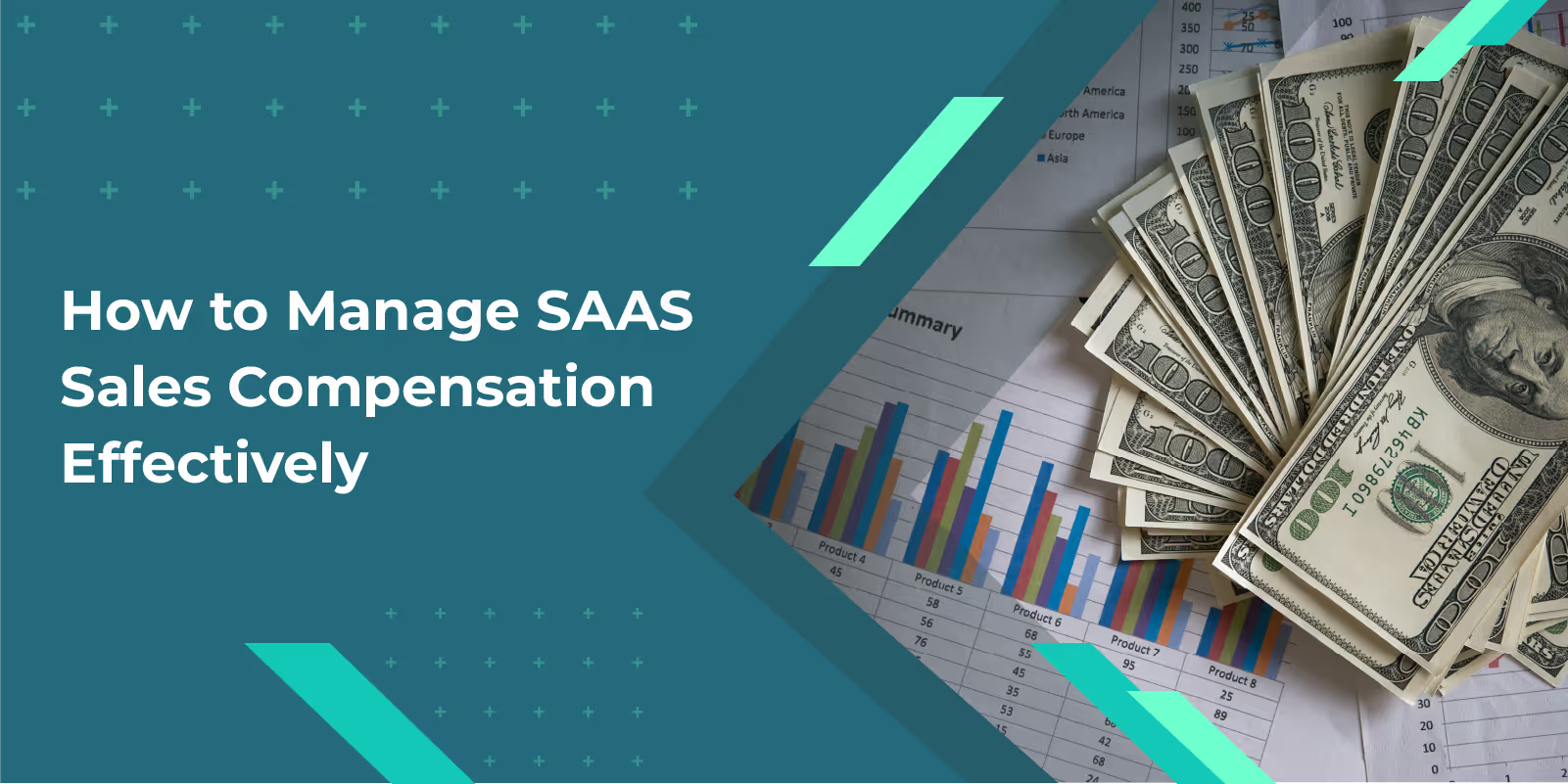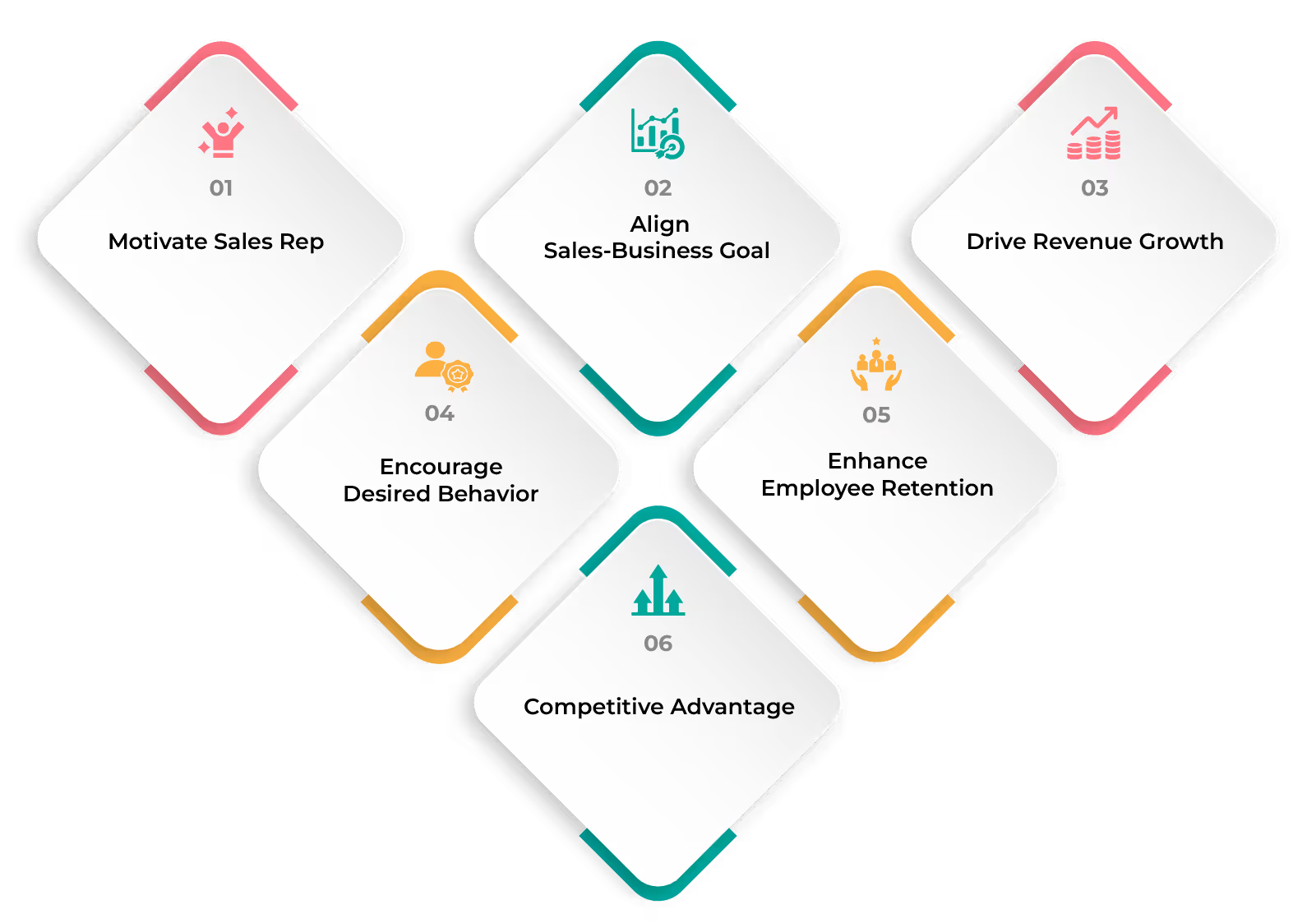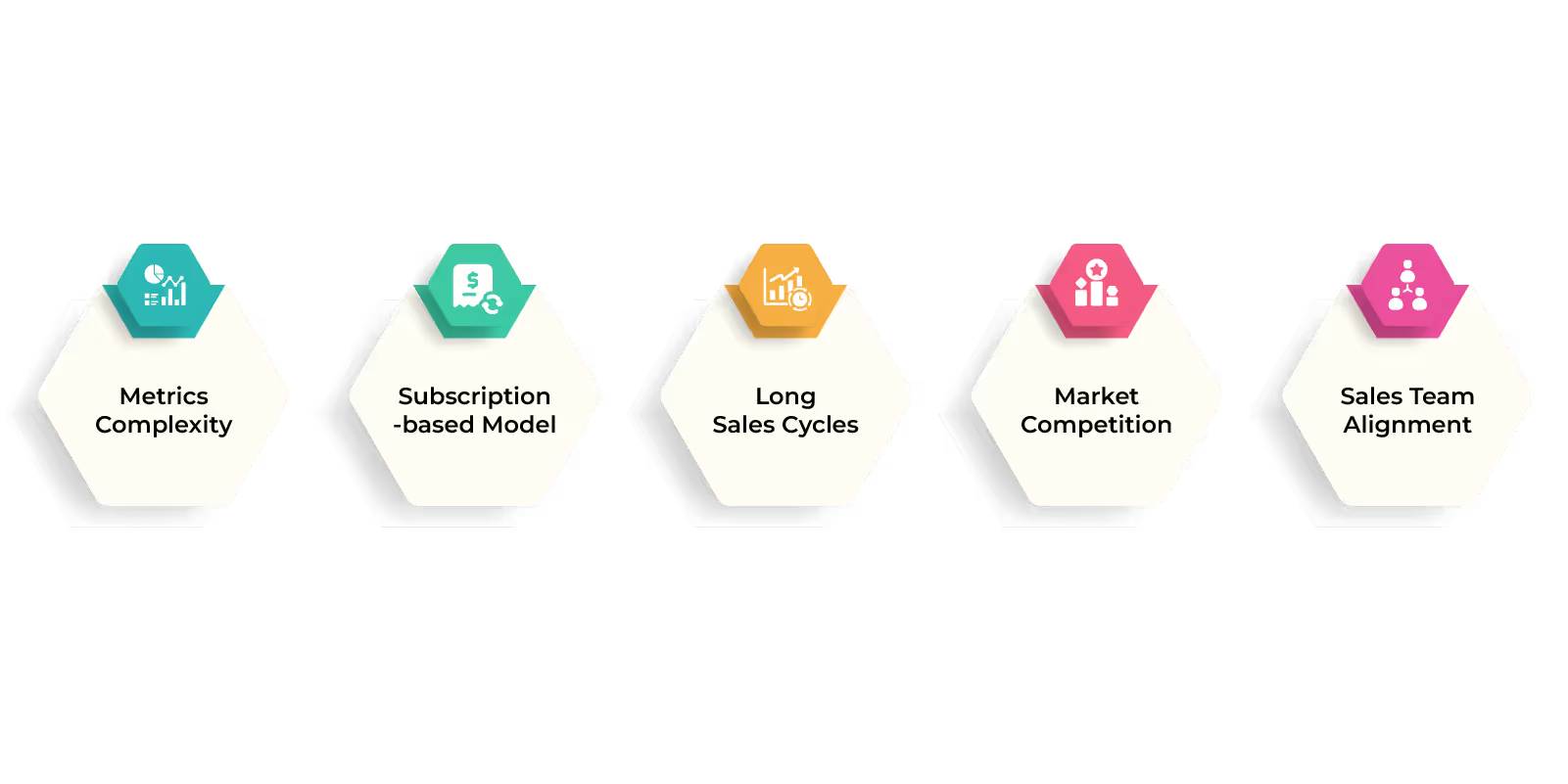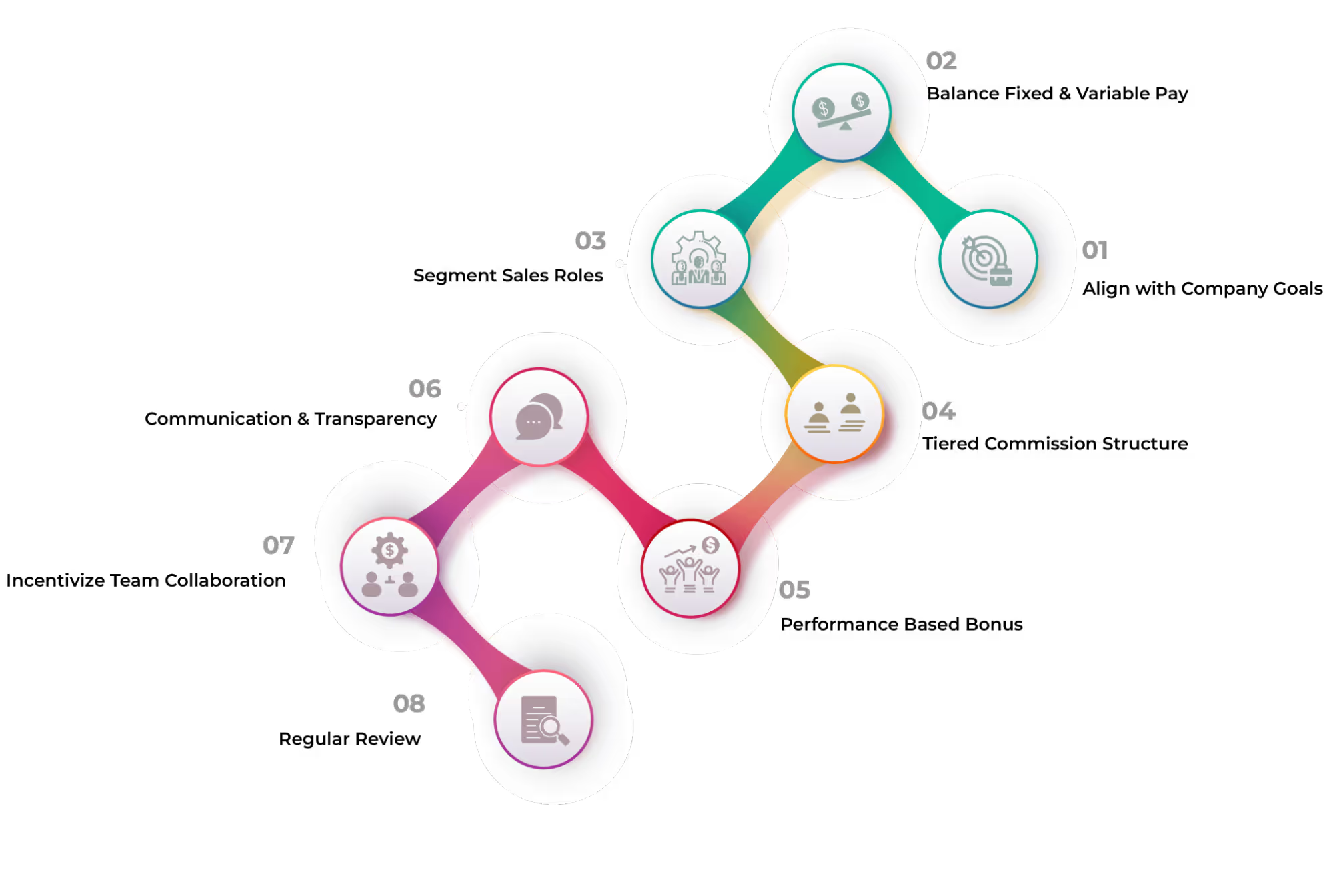
Blog
How to Manage SaaS Sales Compensation Effectively
April 3, 2024


Key Insights
Designing an effective sales compensation plan requires time and effort.
Understanding the business model, its features, complexities, challenges, and uniqueness.
For example, in a SaaS business model recurring revenue generation is as crucial as new customer acquisition. This means the sales team is focused not just on lead generation and prospect conversion but also must focus on building long-term client relationships, ensuring customer satisfaction, retention, and contract renewal.
This means the SaaS sales team roles and responsibilities are broader than compared to traditional sales rep jobs.
In this blog, we will discuss all facets of building an effective sales compensation plan in the SaaS industry. We will discuss SaaS sales compensation meaning, the importance of creating a SaaS commission structure, difficulties of SaaS sales compensation.
In addition, we also discuss the techniques to handle effective compensation plan components to include in the compensation plan and how a sales compensation plan stabilizes your sales team.
What is SaaS Sales Compensation?
SaaS sales compensation refers to the incentive that sales reps selling SaaS products and services earn for closing the deal. The sales compensation structuring and calculation in SaaS are influenced by the subscription-based business model.
This means that sales reps are not just responsible for new customer acquisition but must build strong long-term relationships with their clients to ensure customer retention and recurring revenue generation.
Hence, the SaaS sales compensation plan must consider these sales responsibilities to ensure sales reps drive revenue growth while aligning with the larger company objectives.
Only an effective SaaS commission structure can ensure enhanced sales performance, increased sales revenue generation, improved employee retention, attract top talents, and foster a competitive sales environment.
Why Create a SaaS Sales Compensation Strategy?
Creating a SaaS sales compensation strategy is crucial for your business for several reasons. Let us look at some of these reasons:

- Motivate Sales Rep
The primary function of building a sales compensation plan is to motivate sales reps, improve their performance, and gain the desired results. Recognizing sales reps for their efforts and offering a competitive incentive for their achievements will improve employee morale, enhance retention, and drive them to exceed expectations.
- Align Sales-Business Goal
A well-crafted SaaS sales commission plan will align individual sales goals with the larger company objectives. This ensures that the efforts put by sales reps in closing deals and achieving their sales quotas will contribute to achieving the larger business goals.
- Drive Revenue Growth
In SaaS, revenue growth is measured not just through the closing of new deals but also through recurring revenue. Hence, salesforce compensation will incentivize not just customer acquisition but also retention. Sales commission on recurring revenue will motivate sales reps to build strong and long-term relationships that drive consistent revenue growth.
- Encourage Desired Behavior
Sales compensation can drive positive and desired behavior in sales reps. In SaaS sales compensation, where recurring revenue and customer retention are important, incentivizing contract renewals will promote desired behavior from salesforce to build stronger long-term relationships with their clients.
- Enhance Employee Retention
Businesses must offer competitive sales compensation that is on par with industry standards to ensure employee retention. Only when sales reps are satisfied with their variable pay, see possibilities for career development, and feel recognized for their efforts are they likely to stay.
- Competitive Advantage
In a competitive industry like SaaS, your SaaS sales commission plan is a significant differentiator that will help you attract skilled top talents, retain high-performing sales reps, and ensure a competitive advantage in the industry. Hence, building an effective SaaS sales compensation strategy is crucial to boosting performance and optimizing operations in different areas of sales management. Difficulties in SaaS Sales Compensation PlansWhile building an effective and competitive sales compensation plan is crucial in SaaS, there are a few challenges to be overcome. Let us look at these SaaS sales compensation difficulties that you may encounter:
Hence, building an effective SaaS sales compensation strategy is crucial to boosting performance and optimizing operations in different areas of sales management.
Difficulties in SaaS Sales Compensation Plans
While building an effective and competitive sales compensation plan is crucial in SaaS, there are a few challenges to be overcome. Let us look at these SaaS sales compensation difficulties that you may encounter:

Metrics Complexity
SaaS commission structure takes into account various metrics including Monthly Recurring Revenue, Annual Recurring Revenue, Customer Lifetime Value, Churn Rate, etc. striking a balance between these metrics and incentivizing them becomes a complex process.
Subscription-based Model
Unlike traditional business models, SaaS sales work on a subscription-based model with recurring revenue. This includes contract renewals, upselling, cross opportunities, etc. Management will have a challenging time in determining fair compensation at each stage of the customer lifecycle.
Long Sales Cycles
The SaaS sales process involves long sales cycles. Salesforce will put a lot of time and effort into converting leads and closing deals. Hence, the SaaS sales commission plan must incentivize individual efforts at each stage of the sales pipeline to ensure consistent motivation.
Market Competition
Software as a service is a very competitive industry. Hence, sales reps will have a difficult time generating leads, converting prospects, and closing deals. Businesses thus have the challenge of ensuring a competitive sales commission on par with the industry standards to drive positive desired behavior.
Sales Team Alignment
Within a sales team, each group will be assigned a different role and responsibility. While sales reps might focus on new customer acquisition, the account managers will be focusing on customer retention and upselling opportunities. Ensuring everyone gets a competitive incentive based on their work without creating any differences can be a challenge to companies.
Companies must foresee such challenges and address them effectively to ensure that the compensation structure aligns with the company objectives and drives success.
Techniques to Handle Compensation Plan Structure
There requires a strategic approach to effectively handle your compensation plan structure. Here are a few techniques to help manage and optimize your SaaS sales commission plan:

Align with Company Goals
While setting your individual sales quotas make sure that it aligns with the larger company goals. If the company is working towards enhanced revenue generation, customer acquisition, and retention, the commission structure should incentivize behavior that brings out this output.
Balance Fixed and Variable Pay
Effective compensation must strike a balance between fixed salary and variable pay. The fixed salary must be satisfactory to help sales reps gain financial stability. While the variable pay must create a motivational and competitive environment to achieve their goals and targets.
Segment Sales Roles
Sales compensation must be based on the roles, responsibilities, tasks, and achievements of the salesforce. Hence, there needs a segmentation of the sales roles as a lead generator, account manager, contract renewal, etc to ensure incentives that challenge their role.
Tiered Commission Structure
Tiered commission structure is an effective sales compensation technique that can enhance sales performance while ensuring exceptional sales commission rates. Under tiered commission, sales reps earn a higher commission rate when they exceed their sales quotas and show exceptional sales performance.
Performance Based Bonus
Performance-based bonus incentivizes exceptional sales performance like exceeding sales quotas, closing larger deals, achieving high customer satisfaction, etc. When sales performance is made a metric for commission calculation it will encourage salesforce towards expected behavior and performance.
Communication and Transparency
Rather than a technique, ensuring clarity and transparency in sales commissions is an ethical thing to do. When salesforces are clear on their pay structure, commission calculation, and metrics, they will work towards improving the overall sales experience for customers and their performance for rewards and recognition.

Incentivize Team Collaboration
Sales is a competitive job and in the strive for achieving quotas and commissions, sales can become a lonely job as well. Hence, to enhance team collaborations, create a healthy team culture, and ensure collective achievements, businesses must incentivize team collaboration.
Regular Review
No tool is perfect at all times. It requires regular evaluation by reviewing its effectiveness, gathering feedback, and making adjustments as and when required. This consistent examination and upgradation will help in ensuring the effectiveness of the commission tool.
Implementing these techniques will help you identify any drawbacks to your commission structure, enhancing its effectiveness in motivating salesforce and incentivizing their efforts to drive revenue and growth.
Components to Include in the Compensation Plan Structure
While designing your compensation plan structure it is crucial to include components that provide a proper structure, motivate sales reps, and drive growth. So here are a few key components that must be added to your compensation plan:

Base Salary
Base salary is the fixed pay of the incentive compensation a sales rep earns irrespective of their sales, revenue generation, or performance evaluation.
Variable Pay
Variable pay is the commission that sales reps earn based on their sales performance and closing of deals. It is the motivational factor that is calculated as a fixed percentage of the revenue they generate.
Performance Bonuses
Performance bonuses are offered when sales reps show exceptional performance or exceed their targets. This includes closing large targets, achieving high customer satisfaction, or overachieving their sales quotas.
Quotas
Quotas refer to the targets or goals that sales reps are expected to achieve within a period of time. Setting sales quotas helps sales reps understand what is expected of them and strategize ways to achieve them. This clarity ensures improved performance and enhanced growth potential.
Performance Metrics
Companies must be clear about the metrics used to evaluate sales performance. In a SaaS sales commission plan, these metrics include Monthly Recurring Revenue, Annual Recurring Revenue, Customer Lifetime Value, Conversion Rates, etc. It makes the performance tracking objective and transparent.
Rewards and Recognitions
Cash incentives are just one part of your compensation plan. Recognizing your sales reps, celebrating their milestones, and rewarding them for their achievements are also crucial in a compensation plan. Words of appreciation and validation impact employee morale and engagement.
Incorporating these components in your SaaS compensation structure will help create an effective and comprehensive framework that motivates sales reps, drives revenue growth, and ensures business success.
How Sales Compensation Stabilizes your Teams
Sales compensation plans have a huge role in stabilizing your sales team. From providing financial stability, fostering motivation, ensuring employee retention, and aligning individual and team efforts with organizational goals, the SaaS commission structure touches all areas of sales management.
- SaaS sales commission plan provides financial stability to sales reps through its base salary and the possibility of better earnings through variable pay. It makes the sales reps feel secure and helps them focus on their quotas and strategies to close deals.
- Consistent performance is required to close deals regularly and drive revenue and growth. Sales compensation motivates sales reps to keep them focused, improve their performance, achieve higher targets, and facilitate success.
- An effective and competitive sales commission that is on par with the industry standards will ensure employee retention. When employees feel they are adequately compensated and see opportunities for enhancing their earnings they will stay with the company for a longer period.
- A well-crafted sales compensation plan aligns the individual and team sales goals along with the larger company objectives. This ensures that all efforts to achieve the sales quotas will contribute toward a common objective ensuring consistent growth and success.
- Businesses must ensure they clearly and transparently share the particulars of the incentive compensation plan with their employees. When sales reps understand their sales compensation with clarity it improves their performance and enhances their engagement, loyalty, and retention.
- Sales compensation uses metrics to evaluate performance and calculate commissions. This creates an objective evaluation of the sales performance where it's easy to identify their strengths as well as areas of improvement. This fair and objective assessment will help in the consistent growth of the team.
Thus, a well-designed and implemented sales compensation plan will positively influence all areas of sales operations to bring stability, ensure a high high-performing sales team, and drive business revenue and growth.
Final Thought
Crafting a well-structured sales compensation plan is crucial in SaaS as it influences sales operations in various ways. From motivating sales reps to ensuring their engagement and retention, from aligning individual and business goals to driving revenue and growth, a SaaS commission structure is inevitable.
However, there can be difficulties in compensation plans especially with the unique business model of SaaS that focuses not just on new sales but also recurring revenue generation.
Businesses need to address the complexities of metrics, the long sales cycle, the subscription model, and market competition to name a few.
Navigating through these challenges and effectively resolving these issues based on your business and sales structure helps companies build an effective compensation plan that brings in the desired results.
This requires incorporating a few techniques that help enhance and optimize your operations. Striking a balance between fixed and variable pay, and segmenting sales reps based on their roles and responsibilities, including tiered commission structure and performance-based bonuses can help in boosting your Saas commission structure.
Taking into consideration these factors is necessary to ensure that the sales compensation plan stabilizes your sales team and operation in bringing out the desired behavior and expected results.
To read more about these incentive-related topics, visit our blog resources.
Kennect revolutionizes data-driven sales management with smart, integrated incentive compensation management software and sales performance management software, streamlining sales quota processes effortlessly. For more information, Book A Demo NOW!
ReKennect : Stay ahead of the curve!
Subscribe to our bi-weekly newsletter packed with latest trends and insights on incentives.
Thank you! Your submission has been received!
Oops! Something went wrong while submitting the form.
Your data is in safe hands. Check out our Privacy policy for more info















